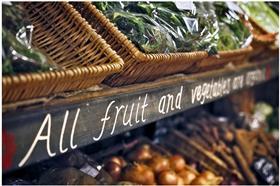
Global organic food and drink sales surpassed $100 billion for the first time in 2018, underlining the accelerating potential of the sector.
According to a new report by Ecovia Intelligence, entitled Global Organic Food & Drink Market Trends & Outlook, worldwide sales rose six per cent to $105bn last year, with North America and Europe accounting for 90 per cent of the market. Despite the dominance of the traditional western nations, however, China, India and Brazil are all developing strong internal markets.
The US continues to dominate, with a hefty 45 per cent of organic food and drink sales taking place in the country, followed by Germany, France, Italy and Canada. Denmark is the nation where organic enjoys the largest market share, of almost 14 per cent, while the highest spenders are Switzerland, Denmark, Sweden and Austria.
Global growth is being driven by rising consumer awareness of organic products and widening availability, according to Ecovia, which adds that distribution of organic lines is increasing in supermarkets, discounters and pharmacies, as well as the catering and foodservice sector. Crucially, major chains including McDonald’s and Pret A Manger have made commitments to organic product sourcing.
Ecovia founder Amarjit Sahota warns that despite the positive trajectory for the sector, there are still significant challenges ahead. The first is demand concentration, with most of the sales coming in affluent countries despite production in 181 nations; organic is also perceived as a rich person’s luxury in many areas; there are a vast number of national and private organic standards; and there is no harmonisation of organic standards outside of the major trading blocs.
There is also growing competition from the plethora of sustainability schemes and ethical labels, Sahota notes.
From a supply perspective, what was once perceived to be an industry for small, specialist farmers is now big business, with another Ecovia analysis noting that the global organic industry is seeing increasing levels of consolidation as major players look to bolster their capabilities and become larger entities.
Traditionally fragmented with many operators involved in production and distribution, the organic sector is seeing rationalisation as large companies buy up competitors and unexpected new players – such as Amazon in the case of its purchase of Whole Foods – moving into the segment.
Ecovia analysts say they expect many more deals as consolidation continues to hit the trade. The group highlighted three recent deals as evidence of the trend: Royal Wessanen, one of the oldest organic food enterprises in Europe, has been acquired by an investment consortium for €885m; US organic salad company Earthbound Farm has been snapped up by Taylor Farms for $400m; and North American drinks manufacturer Bolthouse Farm has been sold to private equity group Butterfly for $510m.
Despite the clear trend, Ecovia warned that getting into organics is not as simple as just buying up a farm, adding that there is no guarantee of market success. “Although healthy growth rates are continuing, the organic food market is becoming increasingly competitive,” it said, citing the example of North American giant Organic Valley, which despite achieving sales of over $1.1bn in 2018, has just reported its second year of losses.
“Organic brands do not always fit well into conventional portfolios, as many large food companies have discovered,” Ecovia concludes. “There is also a concern that consumers will shun organic/sustainable brands if they are no longer true to their ‘green roots’.”






No comments yet